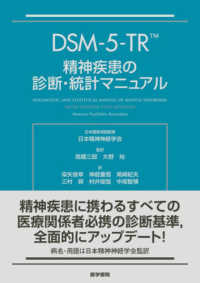Full Description
This book explores the complex web of Strategic Digital Information Operations (SDIOs) - defined as deliberate efforts by state and non-state actors to manipulate public opinion and emotions using digital technologies - that intersect with political ambitions to create a complex environment ripe for manipulation.
Drawing from extensive research and case studies, the book examines how actors ranging from authoritarian regimes to extremist groups such as ISIS, and even political entities in democratic countries, leverage digital platforms to further their agendas. As such, it provides a comprehensive overview of SDIOs, their evolving tactics, and implications for democracy, governance, and international relations. It examines the diverse tactics employed by these actors, from spreading half-truths and distractions to leveraging historical and religious narratives in the form of conspiracy theories or non-conspiracy narratives, aiming to control the discourse and shape the online environment to their advantage. This research challenges the conventional focus on disinformation, highlighting the shift toward more sophisticated and less discernible means of digital manipulation globally, and argues that SDIOs have become a pivotal tool for influencing public opinion, shaping political narratives, and even undermining democratic processes.
This book will be of key interest to scholars, students, and practitioners in communications/media studies, political sociology, comparative politics, security studies, political science, and international politics.
The Open Access version of this book, available at www.taylorfrancis.com, has been made available under a Creative Commons Attribution-Non Commercial-No Derivatives (CC-BY-NC-ND) 4.0 International license.
Contents
1. Goals, Practices and Impacts of Strategic Digital Information Operations (SDIOs) Part 1: Elections 2. A Comparative Analysis of Pakistan's Digital Parties: Beyond Traditional Politics 3. Dis/misinformation, Visibility Politics, Populism, and Digital Information: An Analysis of Pre- and Post-2023 Nigerian General Elections Part 2: Conspiracy Theories 4. The Persistence of Informational Manipulation and the Appropriation of Emerging Events: Conspiratorial Publics 5. The Role of Social Media in the Diffusion of Conspiracy Theories and the Consolidation of Digital Authoritarianism in the Middle East: The Case of Egypt Part 3: Digital Authoritarianism 6.Manufacturing Consent through State Actors' SDIOs in Thailand: #Propaganda 7. Turkish Government's Domestic Digital Information Operations on X (Twitter), Democracy and Social Cohesion 8. India's Strategic Digital Information Operations (SDIOs) 9. Media as a Tool for Strengthening Authoritarian and Populist Tendencies in Central European Countries: A Case Study of Hungary Part 4: Transnational Dynamics 10. Iranian State-Sponsored Disinformation against the Dissidents at Home and in the Diaspora 11. The Influence of the Kremlin in the Media Space of Western Balkan Countries: A Case Study of Serbia 12. The Transnationalisation of Strategic Digital Information Operations: Turkey and India Part 5: Non-State Actors and Extremism 13. Differences in the Utilization of Digital Tools for Information Operations between State and Non-State Actors 14. Alt-Right Ideology, Masculinity, and the Strategy of Information Operations: Understanding Digital Dissonance 15. Future Directions in Strategic Digital Information Operations and Warfare








